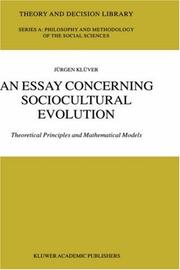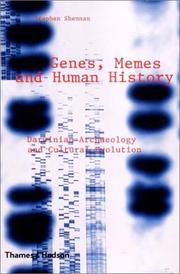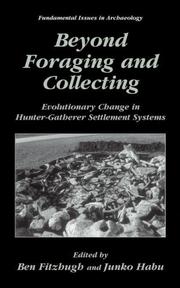| Listing 1 - 4 of 4 |
Sort by
|

ISBN: 2749201101 9782749201108 Year: 2002 Publisher: Ramonville-Saint-Agne: Érès,
Abstract | Keywords | Export | Availability | Bookmark
 Loading...
Loading...Choose an application
- Reference Manager
- EndNote
- RefWorks (Direct export to RefWorks)
Democracy --- Identity (Philosophical concept) --- Démocratie --- Identité --- History --- Political aspects --- Histoire --- Aspect politique --- Démocratie --- Identité --- Anomie --- Psychologie sociale --- Évolution sociale --- Individu et société --- Violence --- Sociologie --- Anthropologie

ISBN: 1402007507 9048160758 9401599769 Year: 2002 Volume: 34 Publisher: Dordrecht Boston London Kluwer academic publishers
Abstract | Keywords | Export | Availability | Bookmark
 Loading...
Loading...Choose an application
- Reference Manager
- EndNote
- RefWorks (Direct export to RefWorks)
Writing about sociocultural evolution is always a complicated enterprise, because the subject is not only difficult in a scientific way but also in a political one. In particular since the events of September 11, 2001 the debates about the differences between cultures and their evolutionary developments have left the fields of pure scientific research once and for all. However, there have probably never been scientific discourses that did not touch the realms of political discussions - Darwin, Marx, the atomic physicists and the recent debates about genetic engineering are just a few examples. The aim of this book is not to take part in these debates but it is written as a contribution to the foundations of evolutionary theories in the social sciences. The readers will have to judge if I have succeeded with it. Perhaps essays like this one will help to clarify the problems we all have to face just now in regard to intercultural discourses. Theoretically and mathematically grounded insights into cultural development as the source of many political problems will not solve to how to deal with them them immediately but may serve as signposts in the long run.
Quantitative methods in social research --- Sociological theories --- Philosophy and psychology of culture --- Social change --- Cultural evolution --- Cultural transformation --- Culture [Evolution of ] --- Evolutie [Sociale ] --- Evolution sociale --- Social evolution --- Sociale evolutie --- Philosophy. --- Sociology. --- Anthropology. --- Philosophy, general. --- Sociology, general. --- Human beings --- Social theory --- Social sciences --- Mental philosophy --- Humanities

ISBN: 0500051186 Year: 2002 Publisher: London Thames & Hudson
Abstract | Keywords | Export | Availability | Bookmark
 Loading...
Loading...Choose an application
- Reference Manager
- EndNote
- RefWorks (Direct export to RefWorks)
Social evolution. --- Evolutionary genetics. --- Human evolution --- Archaeology and history --- Evolution sociale --- Génétique évolutive --- Homme --- Archéologie et histoire --- Evolution --- Evolution (Biology) --- Human evolution. --- Human population genetics. --- Evolution (Biology). --- Génétique évolutive --- Archéologie et histoire --- Evolutionary genetics --- Human population genetics --- Social evolution --- Cultural evolution --- Cultural transformation --- Culture, Evolution of --- Culture --- Social change --- Human genetics --- Population genetics --- Animal evolution --- Animals --- Biological evolution --- Darwinism --- Evolutionary biology --- Evolutionary science --- Origin of species --- Biology --- Biological fitness --- Homoplasy --- Natural selection --- Phylogeny --- Genetic evolution --- Genetics --- Physical anthropology --- Evolutionary psychology --- Human beings --- Origin

ISBN: 9780306467530 0306467534 1461351243 1461505437 Year: 2002 Publisher: Dordrecht : Kluwer,
Abstract | Keywords | Export | Availability | Bookmark
 Loading...
Loading...Choose an application
- Reference Manager
- EndNote
- RefWorks (Direct export to RefWorks)
LEWIS R. BINFORD AND AMBER L. JOHNSON The organizers of this volume have brought together authors who have worked on local sequences, much as traditional archaeologists tended to do, however, with the modern goal of addressing evolutionary change in hunter-gatherer systems over long time spans. Given this ambitious goal they wisely chose to ask the authors to build their treatments around a focal question, the utility of the forager-eollector continuum (Binford 1980) for research on archaeological sequences. Needless to say, Binford was flat tered by their choice and understandably read the papers with a great deal of interest. When he was asked to write the foreword to this provoca tive book he expected to learn new things and in this he has not been disappointed. The common organizing questions addressed among the contributors to this volume are simply, how useful is the forager-eollector continuum for explanatory research on sequences, and what else might we need to know to explain evolutionary change in hunter-gatherer adaptations? Most sequences document systems change, in some sense. Though we don't necessarily know how much synchronous systemic variability there might have been relative to the documented sequence, most authors have tried to address the problem of within systems variability. In this sense, most are operating with sophistication not seen among traditional culture historians. The primary problem for archaeologists of the generation prior to Binford was how to date archaeological materials.
Hunting and gathering societies. --- Human evolution. --- Social evolution. --- Land settlement patterns, Prehistoric. --- Chasseurs-cueilleurs --- Homme --- Evolution sociale --- Colonisation intérieure --- Evolution --- Types préhistoriques --- Colonisation intérieure --- Types préhistoriques --- Human evolution --- Hunting and gathering societies --- Land settlement patterns, Prehistoric --- Social evolution --- Cultural evolution --- Cultural transformation --- Culture, Evolution of --- Culture --- Social change --- Prehistoric land settlement patterns --- Food gathering societies --- Gathering and hunting societies --- Hunter-gatherers --- Hunting, Primitive --- Ethnology --- Subsistence hunting --- Evolution (Biology) --- Physical anthropology --- Evolutionary psychology --- Human beings --- Origin --- Archaeology. --- Life sciences. --- Anthropology. --- Life Sciences, general. --- Biosciences --- Sciences, Life --- Science --- Archeology --- Anthropology --- Auxiliary sciences of history --- History --- Antiquities
| Listing 1 - 4 of 4 |
Sort by
|

 Search
Search Feedback
Feedback About UniCat
About UniCat  Help
Help News
News